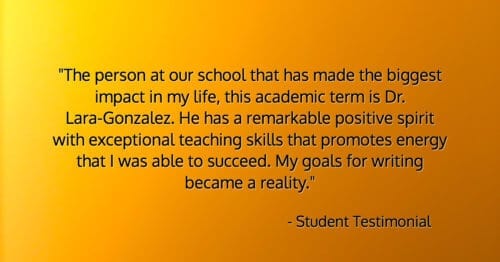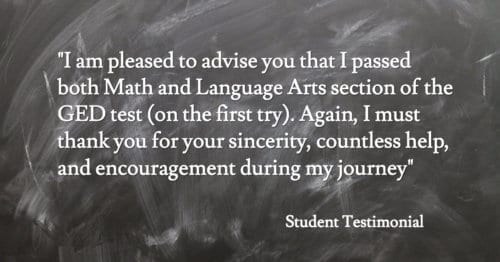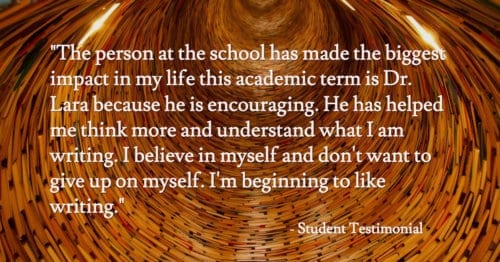Dr. Berger recently posed questions to Dr. Gustavo Lara González, ABE/GED Department Chair at Moreno Valley School District, about his journey from Mexico to the U.S. and his entrance into an educational system that not only earned him a Ph.D. but led him to become a leading Adult Learning advocate. Lara González shares a backdrop to his early student life in Mexico and how he blended his past learning into his teaching methods in the United States. Most of all, Lara González demonstrates how his hardened pursuit of a higher education and eventually teaching, led him to become a leading proponent of Adult Learning, avowing him to lessen the hurdles of his past for others.
Dr. Berger: For those not accustomed to growing up in Mexico, could you give us a broad-stroke portrait of your childhood school environment?
Dr. Gustavo Lara González: I was born in the city of Tepic, the capital of the state of Nayarit but I spent my childhood on my family’s farm feeding pigs and chickens, and milking cows. In those early years, my days started at 4:00 AM before sunrise and ended at 8:00 PM. They mostly comprised of farm labor and school work.
Before going to school, I helped my father feed and milk cows and delivered milk. Once at school, teachers usually assigned me an isolated place in the back of the classroom or the front of a row. It was due to the impregnated smell of manure and milk that never left me, even after several washes.
A primary school environment in those days was marked by work, strict discipline, and respect. The moment I arrived at school, I had tasks to complete such as sweeping and washing floors, picking trash, or cleaning restrooms. In the classroom, the instruction was characterized by rote memorization and intense work throughout the school day. Parents entrusted their children to teachers. Teachers were not only expected to transfer knowledge to children but also played the role of a parent. As a child, I saw my classroom as an extension of my home.
DB: Could you provide a glimpse of the sights and sounds of your childhood learning environment?
GLG: My primary and secondary school were located a short walking distance from my home. I attended school in the morning from 8:00 AM to 12:00 PM and then in the afternoon from  3:00 PM to 5:00 PM. In primary school, children sang repeated multiplication tables, country capitals and other geographical facts loudly and in unison. Before entering the classroom, my teacher checked our hands, face, and shoes to make sure that we were clean and well groomed. The classroom was small, crowded with 50 anxious children. I can still see my teacher, Maestra Margarita, standing at the front of the class waving her arms like a conductor in an orchestra and prompting us to recite rivers, capitals, countries, mountains, presidents from a world map.
3:00 PM to 5:00 PM. In primary school, children sang repeated multiplication tables, country capitals and other geographical facts loudly and in unison. Before entering the classroom, my teacher checked our hands, face, and shoes to make sure that we were clean and well groomed. The classroom was small, crowded with 50 anxious children. I can still see my teacher, Maestra Margarita, standing at the front of the class waving her arms like a conductor in an orchestra and prompting us to recite rivers, capitals, countries, mountains, presidents from a world map.
DB: How does it compare to school settings you see today in the U.S.?
GLG: There are stark differences between the two settings. As a child, I learned that I had to respect and venerate my teachers in the same way I did my parents. We had no authority to question the teacher. In the U.S., before teaching adult learners, I had the opportunity to teach from primary to secondary schools in various capacities and found the exact opposite.
Pedagogically, in Mexico at that time, school instruction was based on rote memorization and repetition. Repetition as a concept is not an effective instructional strategy to develop critical and creative thinking skills, which is highly emphasized in many classrooms across the U.S. When I was growing up, teachers did not nurture a sense of collaboration and teamwork. We did, however, develop social and emotional skills and a sense of service and sharing that was reinforced through our learning.
Finally, technology was not a part of my early experiences in education but is now prevalent across U.S. classrooms. As an educator, I find that technology impacts learning and students by developing a sense of curiosity and prompting them to be more active. With technology in the classroom, I find that my students are inclined to work cooperatively and provide peer tutoring.
As an Adult Learning teacher in the U.S., what skill set (outside of English), do you see as the most pressing concern for the immigrants you teach?
As immigrants, we make the decision to leave our home country for a variety of reasons. The most prevalent are to fulfill the economic needs of our families. For this reason, learning English is a priority but not at the top of the list. The desired skill sets vary depending on the group. For adult learners with a few years of schooling, there is a strong desire to acquire basic numeracy and literacy skills to land a decent job. Additionally, these learners want to acquire these skills because they want to help their children with homework and participate in school activities. In other words, they want to be active participants in the academic success of their children.
For those who completed postsecondary education in their home countries, their concern is the same – to secure a decent job that will provide a sense of economic stability for themselves and their families and where they can best utilize their skills and talents. These students want to move upward very quickly but learning English and having two or three part time jobs, hinders their progress. In turn, they end up sacrificing their aspirations for the stability of their families and wait for the moment when they can pursue their academic goals. This particular group of adult learners envisions themselves and their family members attending postsecondary institutions and obtaining a college degree.
DB: Please tell us how you approached your adult learning in acquiring your Ph.D. What obstacles to learning would you avoid if you could do it all over again?
GLG: My educational journey has been a challenging, stimulating one. I encountered many obstacles but at the same time, came across many individuals who supported me. One of the main obstacles that I encountered was that many people questioned my credibility. Many questioned my intellectual capacity and competencies based on the color of my skin, the accent in my voice, and the quality of my work. They also questioned the assertiveness of my opinions. At the same time, I also met individuals who believed in me and encouraged me to continue. I met people who allowed me to conduct my research and share my findings with them, trusting my research skills. Although I faced many difficult moments, all obstacles in my journey were instrumental in my development as a scholar.
DB: How has your path to obtaining an education in the U.S. influenced your teaching methods today?
 GLG: Many instructors have influenced my instructional practice. I have had the opportunity to observe what is effective teaching and what is not. From a classroom filled with adult learners eager to learn English and other skills to a classroom of adult learners desperate to defend their dissertation, I selected the best instructional strategies to craft my teaching philosophy, which is the foundation of my teaching today. I believe that the effectiveness of my instructional practice is based on three important pillars: transferring the academic rigor of a subject, sharing the experiences of my educational journey, and the application of what is learned in real life, making learning tangible.
GLG: Many instructors have influenced my instructional practice. I have had the opportunity to observe what is effective teaching and what is not. From a classroom filled with adult learners eager to learn English and other skills to a classroom of adult learners desperate to defend their dissertation, I selected the best instructional strategies to craft my teaching philosophy, which is the foundation of my teaching today. I believe that the effectiveness of my instructional practice is based on three important pillars: transferring the academic rigor of a subject, sharing the experiences of my educational journey, and the application of what is learned in real life, making learning tangible.
DB: Why do you think school administrators often create a 2nd hand status for Adult Education?
GLG: Ignorance. School district leaders, as well as school administrators, are often unaware of the strong correlation between educated parents and child learning. They are unable to see that producing a confident, educated parent has significant impacts on student achievement.
I remember my first-day teaching adult learners. That morning, my principal called me into her office and said, “Mr. Lara, adult education is second class education. Whatever you have in the classroom is whatever you are going to need for the rest of the school year.” At the end of that first day of teaching, I concluded that adult learners had first class needs and as a result, needed first class education. Since then, my quest has been to professionalize adult educators and educate school administrators, administrative staff, and school district leaders on the importance of adult education.
I find that they need to be constantly reminded that adult education influences the life of adult learners and their families in many ways related to health, employment, social participation, and social relationships. Many school administrators are not aware that adult schools are in many cases the soul of the community and that education acts as a social equalizer and is a social right. I believe that school districts have the social responsibility to educate not only children but also the parents of those children. By educating parents, we are transforming communities. Changing our communities is the first step in transforming our society.
DB: Do you believe recounting success stories of individuals in Adult Education can bring change to administrative awareness and funding?
GLG: Success stories have little impact on funding K-12 Adult Education. Funding is determined by two main factors: policy makers and school district leaders. The former provides funding, and the latter allocates funding toward education. As part of my work with the California Council for Adult Education, I have been discussing the importance of adult education as a key component of sustainable economic growth and equitable social conditions with policy makers in Sacramento.
Adult education funding is essential to provide the foundational skills to its current and prospected working-age adult population. It is instrumental because the current economy is dominated by knowledge-based industries that require a workforce with specialized skills and advanced knowledge. The K-12 adult school system has unique strengths and attributes that can help the state prepare the next workforce generation to meet the demands of the new economy.
At the same time, I am meeting with school district leaders and school administrators to discuss the importance of adult education in maintaining California’s economic competitiveness associated with social stability and citizen participation. Ongoing dialogue with policy makers as well as school district leaders on the importance of adult education and the economic growth is critical to secure funding and quality administrative practices.
DB: When you turn it off for the evening, and you’re thinking back on your journey as an educator, what impressions seem most lasting?
GLG: The unwavering eagerness of my students to learn and the sense of empowerment when they learn and master a topic immediately comes to mind.
One key characteristic of adult learners is this eagerness to learn and often it is because no one forced them to attend school. They come to my classroom because they genuinely want to learn. Simply put, they soak in every minute of learning. I enjoy seeing their faces when they discover something new. It is truly enriching to witness them acquire a sense of empowerment that motivates them to learn more and transforms them as individuals.
DB: What sticks out as “the reason” you chose to concentrate on teaching adults and more specifically immigrants?
GLG: I have two reasons. One, my father never learned to read and write and could not complete basic numeric operations. Helping adult learners to acquire basic math skills and teaching them to read and write feels as if I were helping my own father. And two, I came to the U.S. as an undocumented immigrant with a Bachelor’s in Civil Engineering and endured a difficult journey working multiple jobs to contribute to my parents’ household and later my family. I see myself in many of my students and feel a social responsibility, as an immigrant and as an educator, to facilitate the educational journey of my students who arrived in the same conditions as I did.
Dr. Gustavo Lara-González is an ABE/GED Department Chair at Moreno Valley School District and Adjunct Professor of Statistics and Mathematics at Brandman University in Southern California. Previously, he taught GED English, Spanish, and Mathematics at the Rialto Unified School District. Dr. Lara-González was a Visiting Professor at the Ibero-Americana University in Tijuana and was a founding member of its Public Administration program. A dual citizen of Mexico and the United States, Dr. Lara-González has a Doctorate in Education in Higher Educational Leadership from Argosy University and degrees from the University of La Verne and the Autonomous University of Guadalajara. Dr. Lara- González speaks Spanish and English. LinkedIn, Twitter, Email: guslaraglez@gmail.com glara@mvusd.net




